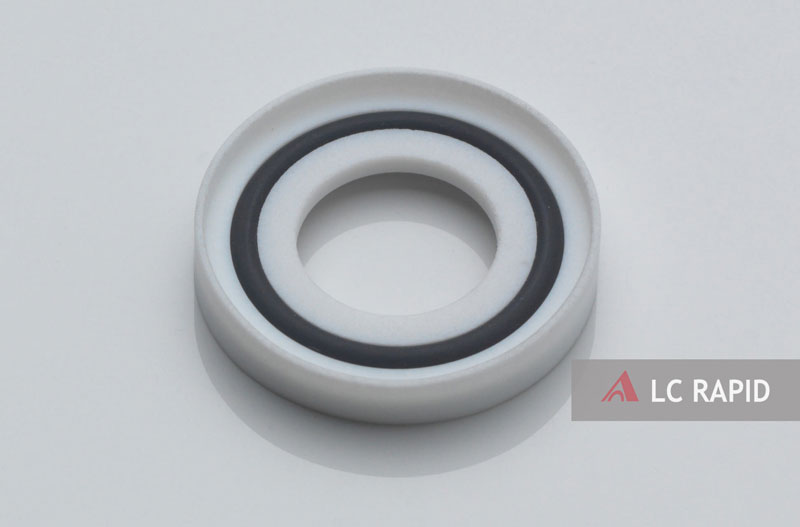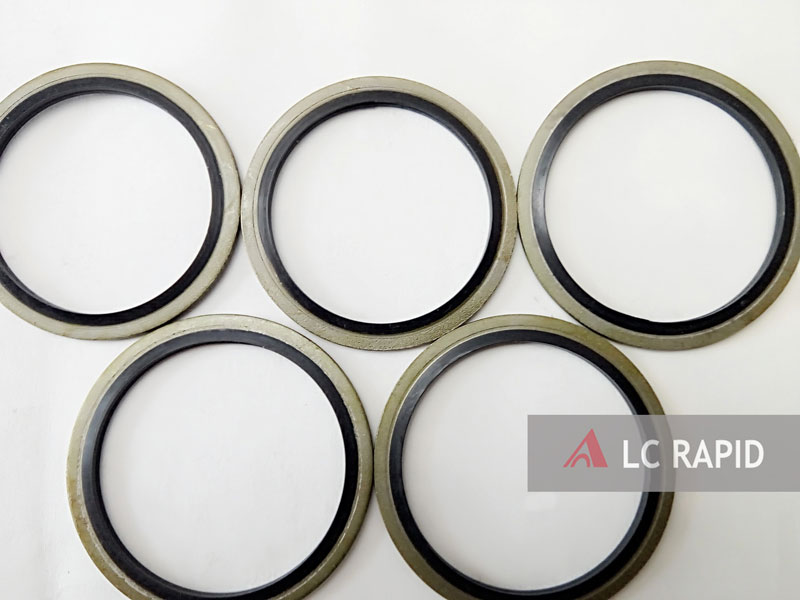+86-18898486814
sales@lcrapid.com
Part1: Metal gasket material
1.Carbon steel
The maximum operating temperature is recommended not to exceed 538 °C, especially when the medium is oxidizing. High Quality Thin Carbon Steel floors are not suitable for use in equipment manufacturing inorganic acid, neutral or acid salt solutions. If carbon steel is under stress, the equipment accident rate for hot water conditions is very high. Carbon Steel gaskets are commonly used for high concentrations of acid and many alkaline solutions. Brinell hardness is about 120.
2.304 stainless steel
18-8(chromium 18-20% , nickel 8-10%) , recommended maximum operating temperature not exceeding 760 °C. Stress Corrosion cracking (SCC) and grain boundary corrosion (Gbr) are easy to occur in the temperature range from-196 °C to 538 °C. Brinell hardness 160.
3.304L stainless steel
No more than 0.03% carbon. Recommended maximum operating temperature not exceeding 760 °C. Corrosion resistance similar to 304 stainless steel. The low carbon content reduces the precipitation of carbon from the Lattice, and the grain boundary corrosion resistance is higher than that of 304 stainless steel. Brinell hardness is about 140.
4.316 stainless steel
18-12(chromium 18% , nickel 12%) , in 304 stainless steel increased about 2% molybdenum, when the temperature increases its strength and corrosion resistance. When the temperature is increased than other ordinary stainless steel has higher creep resistance. Recommended maximum operating temperature not exceeding 760 °C. Brinell hardness is about 160.
5.316L stainless steel
The maximum continuous operating temperature is recommended not to exceed 760 °C ~ 815 °C. Carbon content not exceeding 316 stainless steel has better resistance to stress and grain boundary corrosion. Brinell hardness is about 140.
6.20 alloy
45% iron, 24% nickel, 20% chromium and a small amount of molybdenum and copper. The recommended maximum operating temperature should not exceed 760 °C ~ 815 °C. It is especially suitable for manufacturing equipment with corrosion resistance to sulfuric acid. Brinell hardness is about 160.
7.Aluminum
Aluminium (not less than 99%). Aluminum with excellent corrosion resistance and processing performance, suitable for the manufacture of double-clip gasket. Brinell hardness is about 35. Recommended maximum continuous operating temperature not exceeding 426 °C.
8.Red copper
The composition of Red Copper is close to that of pure copper. It contains trace amounts of silver to increase its continuous working temperature. Recommended maximum continuous operating temperature not exceeding 260 °C. Brinell hardness is about 80.
9. Brass
(copper 66% , zinc 34%) , in most working conditions, has good corrosion resistance, but not suitable for acetic acid, ammonia, salt and acetylene. Recommended maximum continuous operating temperature not exceeding 260 °C. Brinell hardness is about 58.
10. Harrington B-2
(26-30% molybdenum, 62% nickel and 4-6% iron). Recommended maximum operating temperature not exceeding 1093 °C. It has excellent corrosion resistance to hydrochloric acid of heat concentration. Also has excellent resistance to wet hydrogen chloride gas corrosion, sulfuric acid, phosphoric acid and reducing salt solution corrosion performance. It has high strength at high temperature. Brinell hardness is about 230.
11.Harrington C-276
16-18% molybdenum, 13-17.5% chromium, 3.7-5.3% tungsten, 4.5-7% iron, the rest are nickel) . Recommended maximum operating temperature not exceeding 1093 °C. Excellent corrosion resistance. It has excellent corrosion resistance to cold nitric acid or boiling nitric acid with 70% concentration, good corrosion resistance to hydrochloric acid and sulfuric acid and excellent stress corrosion resistance. Brinell hardness is about 210.
12. Enconair 600
Nickel base alloy (77% nickel, 15% chromium and 7% iron). Recommended maximum operating temperature not exceeding 1093 °C. Having high strength at high temperatures, it is commonly used in equipment where stress corrosion problems are to be solved. At low temperature, it has excellent co-processing performance. Brinell hardness is about 150.
13.Monel 400
(30% copper, nickel recommended maximum continuous operating temperature not exceeding 815 °C. In addition to strong oxidizing acid, the majority of acids and bases have excellent corrosion resistance. Stress Corrosion cracking occurs easily in fluoric acid, mercuric chloride and mercury medium, so it is not suitable for the above medium. Equipment widely used in the manufacture of hydrofluoric acid. Brinell hardness is about 120.
14.Titanium
Recommended maximum operating temperature not exceeding 1093 °C. It has excellent corrosion resistance at high temperature. It is well known to be resistant to chloride ion attack and has excellent resistance to nitric acid attack over a wide temperature and concentration range. Titanium is rarely used in most alkaline solutions and is suitable for oxidation conditions. Brinell hardness is about 216.
Part2: Nonmetallic gasket material
1.Natural rubber NR
For weak acid and Alkali, salt and chloride solution has good corrosion resistance, oil and solvent corrosion resistance is poor, not recommended for ozone medium. Recommended Operating temperature-57 °C ~ 93 °C.

2. Neoprene CR
Neoprene is a synthetic rubber that is resistant to moderate corrosion in acid, Alkali, and salt solutions. Good Corrosion Resistance to commercial oils and fuels. However, the corrosion resistance of strongly oxidizing acids, aromatic hydrocarbons and chlorinated hydrocarbons is poor. Recommended Operating temperature-51 °C ~ 121 °C.
3.Butadiene cyanogen rubber NBR
Synthetic rubber is a type of rubber that is resistant to corrosion of oil, solvents, aromatic hydrocarbons, basic hydrocarbons, petroleum and natural gas over a wide range of temperatures. Good corrosion resistance to hydroxide, salts and near neutral acids. However, in strong oxidizing medium, chlorinated hydrocarbons, ketones and lipids, the corrosion resistance is poor, the recommended working temperature is 51 °C ~ 121 °C.

4. Fluoro rubber
It has good corrosion resistance to oil, fuel, chloride solution, aromatic hydrocarbon, lipid hydrocarbon and strong acid, but it is not suitable for amine, lipid, ketone and steam.
5. Chlorosulfonated polyethylene synthetic rubber
It has good corrosion resistance to acid, Alkali and salt solution, and is not affected by climate, light, ozone and commercial fuels such as diesel and kerosene. But not for aromatic hydrocarbons, chlorinated hydrocarbons, chromic acid and nitric acid. Recommended Operating temperature-45 °C ~ 135 °C.
6.Silicone rubber
Good corrosion resistance to hot air. Silicone rubber is impervious to sunlight and ozone. But it is not suitable for steam, ketone, aromatic hydrocarbon and lipid hydrocarbon.
7.Ethylene propylene rubber
It has good corrosion resistance to strong acid, strong Alkali, salt and chloride solution. But it is not suitable for oils, solvents, aromatic hydrocarbons and hydrocarbons. Recommended Operating temperature-57 °C ~ 176.
8. Graphite
The material does not contain resin or inorganic matter, and can be divided into metal doped graphite material or metal element doped graphite material. The material can be bonded to produce pipe gaskets of a diameter greater than 600 mm. Excellent corrosion resistance to many acids, bases, salts, organic compounds, heat transfer solutions and even high temperature solutions. It can’t melt, but it will sublimate above 3,316 °C. The material should be used carefully in strong oxidizing medium at high temperature. In addition to being used for gaskets, the material can also be used for making filler and non-metallic winding tape in winding gaskets.
9. Ceramic fibre, ceramic fibre shaped into strips
The utility model is an excellent gasket material suitable for high temperature and low pressure conditions and light flange conditions. The recommended working temperature is 1093 °C. The non-metal winding tape in the winding gasket can be made.
10. polytetrafluoroethylene
Most of the advantages of plastic gasket materials, including temperature resistance from-95 °C to 232 °C. Excellent corrosion resistance to chemicals, solvents, hydroxide and acids, in addition to free fluorine and Alkali metals. PTFE can be filled with glass to reduce the cold fluidity and creep of PTFE.